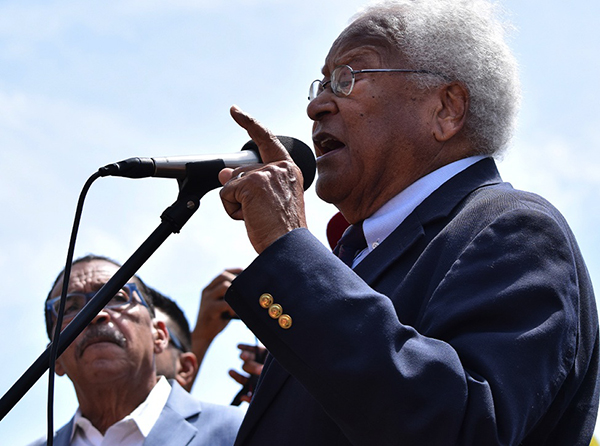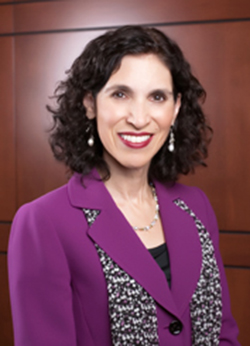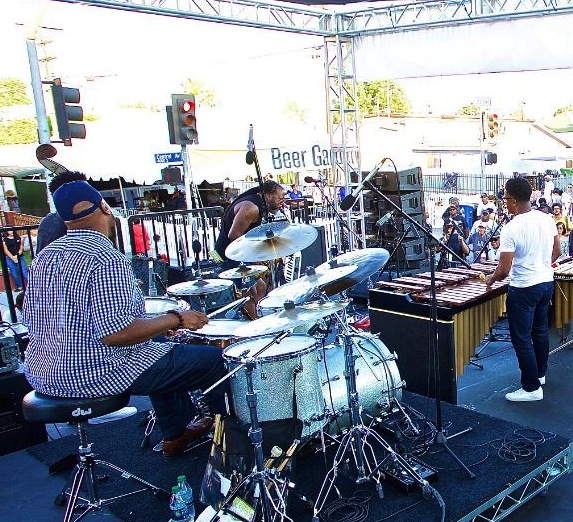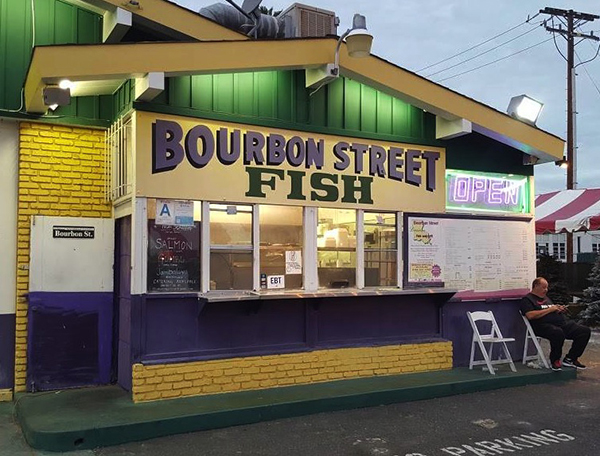Civil rights icon Rev. James Lawson dead at 95

By Darlene Donloe
Contributing Writer
SOUTH LOS ANGELES — Tributes continue to pour in for the Rev. James Lawson Jr., an icon of the civil rights movement and the longtime pastor of Holman United Methodist Church
Lawson died June 9 of cardiac arrest at the age of 95. His family said he died after a short illness.
His death comes two months after another noted South Los Angeles clergyman, the Rev. Cecil “Chip” Murray, the longtime pastor at First AME Church, who died April 5.
Mayor Karen Bass issued a statement, saying “Today Los Angeles joins the state, country and world in mourning the loss of a civil rights leader whose critical leadership, teachings and mentorship confronted and crippled centuries of systemic oppression, racism and injustice.
“Reverend James Lawson Jr.’s life and legacy reverberate in the movement to advance social and economic justice in Los Angeles and beyond,” she continued. “He dedicated his life to equality and justice and helped train a generation of national leaders including Dr. Martin Luther King, Jr. and Congressman John Lewis in nonviolent protest. These teachings changed the course of history.
“Here in Los Angeles, Reverend Lawson taught many activists and organizers and helped shape the civil rights and labor movement locally just as he did nationally,” Bass added. “Through his service as pastor of Holman United Methodist Church in Los Angeles for 25 years and professor at Cal State Northridge, UCLA and more, Reverend Lawson continued to inspire those around him to strive for the betterment of L.A. His teachings now live on in each of us as we continue to push the needle on social and economic justice. My thoughts are with the Lawson family as we join them in the mourning of this great giant.”
County Supervisor Holly Mitchell also issued a statement, saying “I am deeply saddened by the passing of Rev. James Lawson Jr. As a child growing up at Holman United Methodist Church, I was captivated by the resonance of Rev. Lawson’s voice. As an adult, Rev. Lawson continued to impact my life.
“I read his teachings, participated in his non-violence training sessions, and traveled to the home and final resting place of Gandhi,” she added. “I grew to both understand and embrace his concept of the evils of ‘plantation capitalism’ and have been inspired by him, like countless others, to work to manifest his vision of love over violence in my everyday life.”
A leader in the nonviolent struggle for social change, Lawson, the son and grandson of ministers, served as pastor of Holman United Methodist Church in Los Angeles from 1974 until his retirement in 1999.
The iconic civil rights leader, who was a pastor, labor movement organizer, and university professor at Cal State Northridge and UCLA was known for having a rich, decades-long legacy of fighting for racial equality.
Lawson, who trained scores of activists during the early years of the civil rights movement in Nashville — many of whom went on to prominence, was an Ohio native. He studied the nonviolent resistance techniques championed by Mahatma Gandhi while serving as a Methodist missionary in India.
Upon his return in 1956, he began studying theology at Oberlin College, where he was introduced to Martin Luther King Jr. Lawson and King quickly bonded over Ghandi’s ideas.
King urged Lawson to move south and by 1958, Lawson was a student at the Vanderbilt University Divinity School while also serving as the southern director for the Congress of Racial Equality and conducting workshops in nonviolence techniques for students from Fisk University, Meharry Medical College, Vanderbilt, Tennessee Agricultural and Industrial State University and American Baptist College.
While a student at Vanderbilt, he led sit-ins to have lunch counters desegregated in Nashville. His efforts got him expelled from the school, which decades later awarded him for his work. The school has a scholarship in his name.
After his expulsion, he enrolled at Boston University where he earned a master’s degree in theology. He would later become pastor of churches in Shelbyville and Memphis, Tenn.
Among the students he tutored was John Lewis, who went on to chair the Student Nonviolent Coordinating Committee and later to serve in Congress; Diane Nash, Bernard Lafayette and Marion Barry. He also influenced the Freedom Riders to peacefully withstand vicious responses to their challenges of racist laws and policies.
Born in Uniontown, Pennsylvania, and raised in Massillon, Ohio, Lawson was considered a master strategist and careful planner, who believed that only a nonviolent movement, led by young people, would end segregation.
Lawson convinced students they had the potential to overturn segregation through the righteousness of their ideas and the power of nonviolent protest.
During his workshops, he taught students to endure taunts, slurs and blows from the segregationists and to protect themselves without striking back. They began taking part in sit-ins at downtown businesses in 1959.
Lawson was among the first Freedom Riders arrested in Jackson, Mississippi, as the activists sought to integrate interstate bus and train travel. During the “Bloody Sunday” clash in March 1965, he was among the protesters beaten by authorities at the Edmund Pettus Bridge in Selma, Alabama, during a march for voting rights.
Along with Ralph Abernathy, Roy Wilkins, Bayard Rustin and James L. Farmer, Lawson was one of the architects of the 1960s civil rights struggle. He helped launch the Student Nonviolent Coordinating Committee, which was a foundation of the civil rights movement.
Through his nonviolence principles, Lawson helped shape every sit-in, freedom ride, march, and other milestones during the civil rights era.
Lawson, who knew from the time he was in junior high that he was “anti-prejudice and anti-war,” spent 13 months in federal prison for refusing the Korean War draft.
When he got out, Lawson went to India to study Gandhi’s nonviolence principles.
King told him his principles of peaceful resistance were needed to define the movement in America and once called Lawson, “The greatest teacher of nonviolence in America” and “The leading theorist and strategist of nonviolence in the world.”
During an interview with The Wave in 2022, Lawson was asked whether he ever thought about his mortality.
“Yes,” he said. “I recognize I’m at the tail end of my life. I have two or three more tasks that God wants me to finish. When those are done. I know I’m always close to death. I’m 93. I think of it all the time.”
Lawson said one of the tasks he wanted to complete was his memoir.
“I have a contract with a publisher and a collaborator trying to write it,” he said. “The goal is to get the first manuscript done. I have a lot of stories that are not known. I’m the only one who knows the story because I was the only one who was there. The story about how the March on Washington happened has never been told. No one reported on it because no one knew.”
The King Center released a statement on Lawson’s death that read: “The King Center mourns the passing of Rev. James Lawson Jr., a leading nonviolent strategist and tactician whose insight was deeply valued by Dr. Martin Luther King Jr. His legacy of nonviolent activism continues to inspire us. Our condolences to his family and all touched by his work.”
The Rev. Al Sharpton, founder of the National Action Network, said “James Lawson was the ultimate preacher, prophet and activist. Lawson helped to change this nation. Thank God the nation never changed him.”
“We just lost a moral giant and spiritual genius. Rev. James Lawson, one of the greatest freedom fighters of our time,” said Cornel West. “His courage and compassion was incredible. His prophetic witness shall forever burn in my heart.”
Closer to home, Los Angeles Urban Policy Roundtable President Earl Ofari Hutchinson said in a statement, “Jim Lawson was not just a civil rights icon based on his longstanding civil rights and social justice advocacy work, friendship and even mentoring of Dr. King. He was sadly one of our few last, but precious, links to a golden era of civil rights struggle, activism and change that profoundly and forever altered the racial and social justice shape of America. I and countless others owe an eternal debt of gratitude to the life, legacy, and spirit of Dr. James Lawson. That legacy and spirit … can’t ever die.”
Radio personality Tavis Smiley wrote: “Whenever he spoke, I listened. Intently. What Rev. Lawson had to say was always worth hearing — and wrestling with. A truth teller at all times. We have lost a civil rights giant in Rev. Lawson. His sobering voice will be sorely missed.”
City Councilman Curren Price said, “Rev. Lawson was a giant among us. His name is synonymous with justice, compassion, and unity. Profoundly influenced by luminaries like Mahatma Gandhi, he became a pioneer of nonviolent protest in his own right, rising to become one of the foremost civil rights strategists alongside Dr. Martin Luther King Jr.
“In his longtime role as pastor at Holman United Methodist Church, he provided comfort and hope to families in South LA.”
Assemblyman Mike Gipson wrote: “A civil rights movement legend who mentored the activists of SNCC and marched in Memphis with Dr. King, a leader in the Good Trouble of his era who was expelled due to student activism, Rev. Lawson also served … as a respected pastor in Los Angeles. Yet, as sad as I feel to lose an icon, I am in awe of such an accomplished life. May he rest in peace.”
Lawson is survived by his wife, Dorothy Wood Lawson, who worked as an NAACP organizer. The couple had three sons, Morris, John and Seth, who died in 2019.
Funeral services were still pending at press time.
Darlene Donloe is a freelance reporter for Wave Newspapers who covers South Los Angeles. She can be reached at ddonloe@gmail.com.





